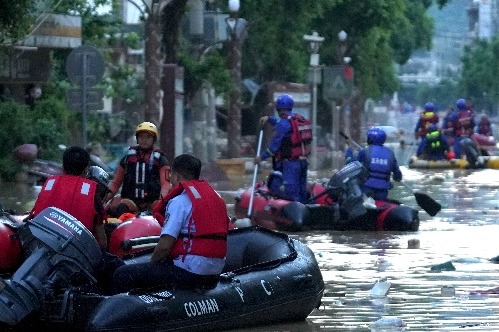Is global cooperation still possible?


This is the first time since World War II that the entire international community is facing a multidimensional humanitarian crisis with long-term consequences. In the first weeks of the novel coronavirus outbreak, preventing and controlling the virus appeared to be the internal affair of individual countries, and the international community seemed unable to build a united front to respond to the epidemic or develop a strategy to deal with the immediate and long-term consequences of the global public health crisis.
Collective efforts began only on March 26 with the Extraordinary G20 Leaders' Summit, which pledged to act as a "united front" against the virus that "respects no borders".
At the summit, President Xi Jinping presented a four-point initiative: Commitment to wage a comprehensive war on the pandemic; collective action to control and deal with the pandemic; relevant international organizations playing an active role in fighting the virus; and boosting coordination of international micro-economic policies to boost the global economy.
In keeping with China's initiative, the summit statement emphasized that to defeat the virus, we need global cooperation, should pay special attention to the needs of developing and least-developed countries, particularly in Africa and small island states, and pump $5 trillion into the global economy.
US continues to push 'America first' policy
Although the international community, in general, has come together to fight the outbreak, the United States administration remains committed to its "America first" policy while opposing any multilateral frameworks to overcome the global public health crisis. And the latest developments-Washington intensifying its attack on Beijing and some US states and nationals filing lawsuits against China demanding compensation for the damage caused by the pandemic-show global solidarity is at peril.
At the United Nations, Secretary-General António Guterres has given a call for a global ceasefire to focus efforts on combatting the pandemic, so has the League of Arab States secretary-general. And the African Union has held two mini-summits to develop a common, coordinated and comprehensive plan to fight the pandemic, with French President Emmanuel Macron, who took part in one of them, emphasizing self-reliance and urging international partners to help the continent contain the virus.
Indeed, since the epidemic broke out, the US administration has adopted a much more aggressive approach against other countries, including some of its closest allies, and devoted its diplomatic and media campaigns against China and Iran-as well as Russia and Saudi Arabia for the drastic fall in oil prices.
Among the conspiracy theories doing the rounds one claims the novel coronavirus was "developed" in a lab in China to be used in a "biological weapon". But refuting such claims, a new study by some US scientists published in Nature Medicine journal on March 17 concludes that the virus has its origin in nature, which was later echoed by the World Health Organization.
The crisis management practices of many countries reveal a great deal of selfishness-and indifference when it comes to cooperating with neighboring countries. Some Western countries have even "stolen" medicines and medical equipment destined for other countries that desperately needed them to fight the outbreak.
Besides, contrary to US claims, China has been exchanging detailed information about the virus with the WHO since the epidemic was first reported in Wuhan, Hubei province. It also completed the genome sequencing of the virus-important for finding a cure or developing a vaccine-and shared the information with the WHO.
As for the European Union, its member states have taken anti-virus measures without any significant coordination, including the closure of their borders. Also, countries such as Germany and France, separately, banned the export of certain products needed to control the spread of the virus (face masks, ventilators for instance) in violation of the basic principles on which the EU was founded, that is, the free movement of persons and goods. Many EU officials have criticized such measures, saying they undermine European solidarity and prevent EU countries from adopting a common approach to fight the virus.
In early March, Italy called on other EU countries to provide emergency medical equipment, whose shortage had forced doctors in the country to warn that if they didn't get the equipment, the consequences could be terrible.
The question is: Given that many countries have adopted selfish crisis management measures and are unenthusiastic about global cooperation, should we assume multilateral action is no longer important, rather possible, to deal with common global threats?
Global solidarity key to neutralizing threats
It is natural, especially during emergencies, for countries to pay special attention to their nationals. Yet a global threat is supposed to unite all countries, as only through joint efforts can we overcome a common threat. And global solidarity is the most important factor in the fight against the virus. In fact, China's role underscores the importance of international cooperation and collective action to meet global challenges.
China has sought to fill the vacuum left by the withdrawal of the US from global leadership not only through cooperation with the WHO but also by dispatching medical supplies and medical experts to different countries to help them fight the pandemic. To be sure, China's crisis management and support for other countries are a reflection of its prominent position in today's world order.
Egypt, China coordinating to boost anti-virus fight
Finally, within the framework of the historical relations between Egypt and China, both sides have affirmed their solidarity. The Egyptian government, as a symbolic expression of this solidarity, sent two shipments of medical equipment and face masks when the epidemic situation in China was very serious.
And Egyptian minister of health Hala Zayed was the first minister of health in the world to visit China at the peak of Beijing's battle with the coronavirus. On its part, China supports Egypt-including with medicines, medical equipment and health experts-in its efforts to contain the outbreak.
It is also important to emphasize that the two countries have been consulting and coordinating their efforts at all levels to contain the pandemic.
The author is executive director of the Egyptian Council for Foreign Affairs.
The views don't necessarily reflect those of China Daily.
































